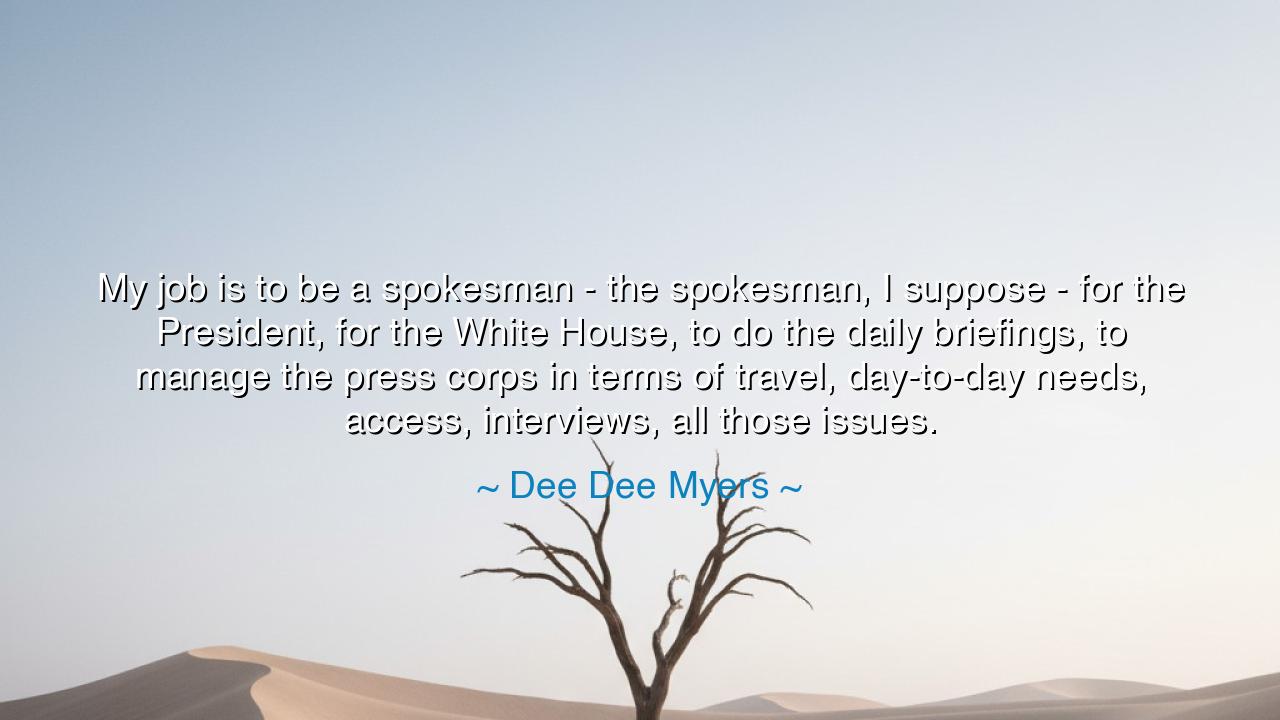
My job is to be a spokesman - the spokesman, I suppose - for the
My job is to be a spokesman - the spokesman, I suppose - for the President, for the White House, to do the daily briefings, to manage the press corps in terms of travel, day-to-day needs, access, interviews, all those issues.






In the days of the ancients, the spoken word was held as sacred, for it was through the tongue of the herald that the will of the king was made known. Dee Dee Myers, with humility and clarity, once declared: “My job is to be a spokesman – the spokesman, I suppose – for the President, for the White House, to do the daily briefings, to manage the press corps in terms of travel, day-to-day needs, access, interviews, all those issues.” In these words lies not merely a description of labor, but the essence of representation, the sacred duty of carrying another’s voice faithfully to the people. It is a role not unlike that of envoys in the courts of emperors, or the scribes of temples who carried divine decrees to trembling ears.
Consider, then, what it means to be a spokesman. It is not to speak one’s own heart, but to bear the words of another with unwavering loyalty. The voice becomes a vessel, the mouth an instrument, the breath an offering in service to a higher station. Just as the herald of ancient Sparta read proclamations from the ephors without altering a syllable, so too did Myers stand as the voice of the President, translating the lofty realm of governance into the language of the waiting press. This task requires not only eloquence but restraint, not only clarity but courage.
And yet, her confession reveals more than duty. In her careful enumeration of responsibilities—briefings, travel, access, interviews—we glimpse the unseen weight that rests upon one who manages the bridge between power and the multitude. These are not small tasks, but daily labors that demand vigilance. The one who holds this role must balance truth and discretion, openness and protection, lest the bridge collapse under the weight of rumor, secrecy, or chaos. Such is the paradox of the spokesman: to speak openly, yet guard faithfully.
History offers us examples of this sacred balance. Recall Caius Maecenas, the trusted advisor of Augustus Caesar. Though he wielded no legions, his words shaped Rome itself. He calmed senators, soothed allies, and managed perception so that the emperor’s authority was preserved without constant strife. Like Myers centuries later, he bore the burden of mediation between the highest power and the restless public. His art was diplomacy, his strength discretion, his tool the gentle force of words. Through such men and women, empires endure.
But let us not imagine this duty belongs only to those in gilded halls. Each among us, in our own sphere, is at times a spokesman. We carry the voice of our families, our communities, our friends. A child speaks on behalf of a struggling parent, a student explains the vision of a teacher, a leader echoes the needs of their people. When we speak for another, our task is holy: to honor their truth, to protect their dignity, to preserve their meaning. To betray it is to wound trust; to honor it is to build harmony.
From this, dear listener, learn this lesson: the tongue is a sword, but also a shield. To wield it in service of another demands both strength and humility. If you are chosen to carry another’s word—whether in matters grand or small—speak with clarity, with faithfulness, and with grace. Hold your own pride in check, and let the truth of the one you serve shine more brightly than your own.
Practically, this means listening with reverence before you speak. It means writing down the message before adding your own flourish. It means pausing, when tempted to embellish, and asking: “Does this reflect their truth, or only my vanity?” In daily life, practice being a faithful voice for others. Speak well of a friend in their absence. Share the hopes of a colleague without stealing their credit. Carry the needs of your family to the world with honesty, not shame.
For the ancients taught that the herald’s honor was not in his words, but in his faithfulness. And if we can learn from Myers’ reflection, let it be this: that to be the spokesman of another is a sacred charge. Guard it, honor it, and in so doing, you will not only give voice to another—you will strengthen the very bonds of trust that hold all human fellowship together.






AAdministratorAdministrator
Welcome, honored guests. Please leave a comment, we will respond soon